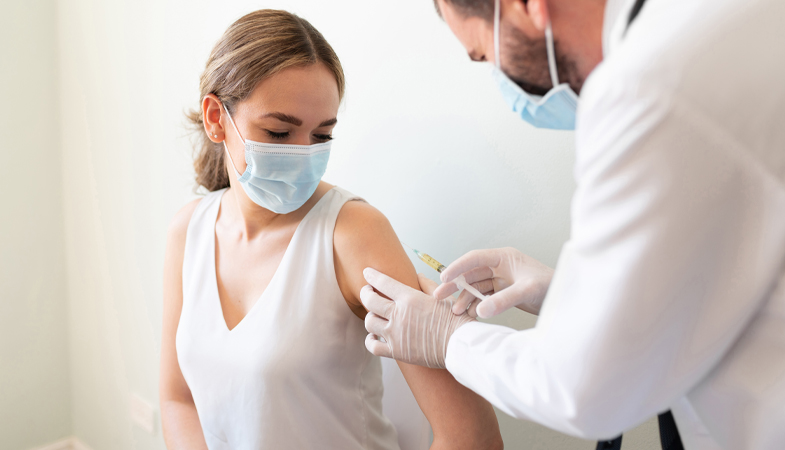What to Expect this Flu Season
An expert shares how to prepare for this flu season and why getting both a flu shot and the new COVID-19 booster vaccine is safe.


Since the COVID-19 pandemic hit, experts have been bracing themselves each winter for a “twindemic,” a surge in cases of both the flu and COVID-19 at the same time. The past two flu seasons did not end up being as severe, partly because more people were wearing masks, social distancing, and hand washing. But as restrictions continue to loosen, health experts are worried about a worse-than-usual flu season this winter.
In late April and early May, New York state already saw an unusual spike in influenza, which could be attributed to relaxing of masking and distancing. And Australia is nearing the end of its worst flu season in five years, which may be an indicator of what the United States might experience in coming months.

Dr. Keith Roach
“The flu is nasty, and the best way to protect yourself is with the vaccine,” says Dr. Keith Roach, a general internist and an associate attending physician at NewYork-Presbyterian/Weill Cornell Medical Center. “And with COVID-19 still out there, it is perfectly safe to get the flu shot and updated Omicron booster at the same time.”
Health Matters spoke to Dr. Roach about what to expect this flu season and the best time to get vaccinated.
What can we expect this flu season?
Many experts are predicting a severe flu season because there may be overall less population immunity due to the low flu seasons the last two years. We are not seeing a lot of people getting flu shots, which is another big red flag that this may be a bad year. These are good reasons for people to get flu shots.
I am concerned that the COVID-19 infections will skyrocket this winter as people get together and take fewer precautions. Because most people are vaccinated, I don’t expect nearly as many deaths and hospitalizations as there were in the last two years. But to protect yourself and loved ones, get your flu shot and COVID-19 boosters (when eligible) and continue to be cautious this winter. COVID-19 is still out there and flu may come roaring back.
Why is it so important to get vaccinated against the flu?
People seem to forget how serious the flu can be; it is potentially life-threatening. An average of 30,000 people die from influenza every year, and some of them are kids. That is why I urge everyone to get the flu vaccine. It is safe, effective, and it will protect you and your community from illness.
The flu shot is recommended for everyone 6 months of age and older. On average, it is about 50% effective at preventing the flu, but importantly, for vaccinated people who do catch the flu, it will reduce the severity of illness and decrease the risk of hospitalization.
Is it safe to get the flu vaccine at the same time as a COVID-19 vaccine or booster?
Yes. We already give people multiple vaccines at the same time. Our bodies can certainly handle all of the antigens in these vaccines without any trouble. However, both vaccines can cause similar side effects, so if you had a bad reaction to either the flu shot or COVID-19 vaccine, your side effects could be more severe if you get them at the same time. If you have a history of bad reactions, you can separate the shots by a few days or a week.
“Many experts are predicting a severe flu season because there may be overall less population immunity due to the low flu seasons the last two years.”— Dr. Keith Roach
Are some people more at risk of catching the flu?
I recommend the vaccine for nearly everyone, and especially for people who are more vulnerable to the flu — including children under 5, the elderly, and people with weakened immune systems. We are also particularly worried about patients with chronic diseases, such as pulmonary illnesses like severe asthma, or heart disease. These are the people who are most at risk for developing severe flu and ending up in the hospital. It is also important for people who are more likely to be exposed to the flu — like teachers, parents, day care workers, and health care workers — to be protected.
How about kids?
Now that children are back in school and families are gathering again, there is going to be more exposure to the flu. Kids are often how a virus gets into a household, because they are around other kids and more likely to catch it. So even if the adults may be being careful, this could be a big year for the flu because it’s going to be generated by kids who are going to come home and give it to their parents.
The vaccine will keep families and kids safe — especially multigenerational families.
When is the best time to get the flu vaccine?
The ideal time to get the flu shot is somewhere in the range of late September to end of November. And the absolute ideal is probably between mid-October and mid-November. That’s because in New York the flu season typically begins toward mid-to-late December. We know that the flu shot takes about two weeks for it to start working, so this way you’ll be well protected by the time flu season starts.
And a flu vaccine is necessary every year because it provides protection for only one season.
Where can you get the flu vaccine?
The vaccine is the same wherever you go, whether it’s a chain pharmacy, independent pharmacy, a health clinic, or your doctor’s office. For people who are over the age of 65 or especially vulnerable, we recommend the high dose — or adjuvanted — flu shot, which is a slightly higher dose and offers stronger protection. If you meet those criteria, we do prefer it.
I get a lot of people asking me, “If it’s only 40% or 50% effective, why should I bother with it?” And the answer is: Any protection is better than none. Before COVID-19, during flu season in January and February, sometimes half or more of the medical ICU was people with influenza-related pneumonia. Flu shots give you even more protection from bad complications of flu.
Additional Resources
Learn more about the COVID-19 vaccine.
Schedule to get a COVID-19 booster shot at NewYork-Presbyterian.
Find out more about flu prevention, symptoms and treatment.

